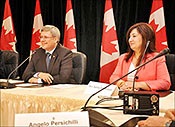 The report was recently submitted to the two governments.
The report was recently submitted to the two governments.
"We have completed the study, and we should hope that in the near future, it would be the basis for beginning some serious negotiations on such an arrangement," Harper said in response to a question from India Abroad at a special roundtable of media persons from different communities in Toronto on August 17.
Conservative MP Bob Dechart and newly minted Senator Salma Attaullah, the first political appointment from the Pakistani-Canadian community, accompanied the prime minister.
"But there (are) lot of steps to be undertaken to get there we are going to maintain the pace of ministerial level visits to India in pursuit of these objectives," Harper added.
Food processing minister Subodh Kant Sahay, power minister Sushilkumar Shinde, commerce minister Anand Sharma and civil aviation minister Praful Patel are scheduled to visit Canada in September.
Harper said agriculture minister Gerry Ritz and ummigration and citizenship Minister Jason Kenney would visit India soon.
Sources say before serious negotiations can commence between officials on both sides, they have to get mandates from their respective federal cabinets.
That process could take up to six months, and the agreement could take up to two years to finalise.
'There's a growing range of cooperation between our countries, not just on economic matters, not just on matters like civilian nuclear energy, but also on matters like security,' Harper said. 'India is a country that shares much common history and common values with Canada, and common interest in the world of the future.'
He also took questions on community and national issues, including the civilian nuclear agreement with India, the arrival of 492 Tamil Sri Lankans on board the MV Sun Sea, the economy, elections, the G20 in Seoul etc.
To a query pertaining to the 'tiny section of many communities - Muslims, Sikhs, Tamils, etc - who perpetuate a hatred campaign from Canadian soil,' he said, 'The vast majority of people who come to this country from, not just the Indian subcontinent, but from all parts of the world do so because they see a land of tremendous opportunity for themselves, their children and their descendants.'
'They come here not to abandon their roots, but they come here to belong to Canada and to contribute to the country and ultimately to maintain their roots and their good relations with those who they've left behind,' he added.
"(But) there's always been small elements who have to come this country who had other agendas, violent agendas; either here or violent agendas related to their homeland a small element that sees its place in Canada as a base to export old battles and old animosities back to India."
Security agencies 'monitor these people,' he added.
Image: Canadian prime minister Stephen Harper and Pakisthan senator Salma Attaullah in Toronto.










 © 2025
© 2025